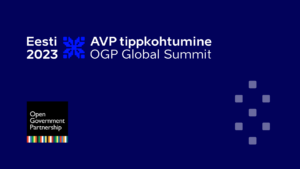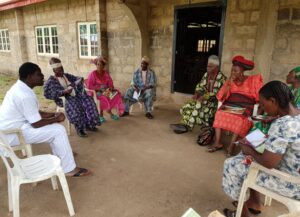Open Government is Essential to Make Localisation a Reality
There has been a welcome debate in recent years about how to shift power, decisions, and resources on economic and social development into the hands of the people closest to the problems that need solving. This shift to localisation includes reforming international development finance, of which only a tiny fraction reaches local actors directly (such as community organisations in Nigeria), and considering ways of devolving more power within highly centralised countries like the UK. The values and principles of open government can help deliver these shifts, as new analysis from the Open Government PartnershipThe Open Government Partnership (OGP) is a multi-stakeholder initiative focused on improving government transparency, ensuring opportunities for citizen participation in public matters, and strengthen... More (OGP) outlines.
Check out OGP’s latest analysis on advancing localisation and the role of funders, intermediaries and local actors.
Open government at its core is about citizens, civil society, and government collaborating to find solutions to common problems. TransparencyAccording to OGP’s Articles of Governance, transparency occurs when “government-held information (including on activities and decisions) is open, comprehensive, timely, freely available to the pub... More of government information and activity makes this easier, and accountability ensures government delivers on what it promises and does not become corrupt or self-serving. OGP was born to give a framework to make concrete policy commitments through a local co-creation processCollaboration between government, civil society and other stakeholders (e.g., citizens, academics, private sector) is at the heart of the OGP process. Participating governments must ensure that a dive.... And twelve years since its founding, many member countries have produced multiple action plans that have included reforms on issues like public services, climate change, anti-corruption and digital governanceAs evolving technologies present new opportunities for governments and citizens to advance openness and accountability, OGP participating governments are working to create policies that deal with the ... More. Enlightened donors in many countries have sought to support these plans, through backing the civil society coalitions that engage in the process and providing technical and financial support for the implementation of the commitments. The OGP platform is the perfect vehicle to put localisation into action and see concrete results.
In Nigeria, where BudgIT was founded, there is a large movement for open government at the national and state level. Hundreds of civil society organisations have formed the Open Alliance that has brought together groups working on budgets, health, extractive industriesApplying open government values of transparency, participation, and accountability to extractive industries can decrease corruption, safeguard community interests and needs, and support environmental ..., freedom of information and many other issues. The Alliance works with the government to identify shared priorities, and as a result important reforms have moved forward. For example, Nigeria’s public register of beneficial ownershipDisclosing beneficial owners — those who ultimately control or profit from a business — is essential for combating corruption, stemming illicit financial flows, and fighting tax evasion. Technical... More emerged through this process and will soon provide information on the true owners of companies registered in the country, helping reduce corruption and create a better business environment. This reform is being supported by donors in Nigeria and multilateral institutions like the World Bank. It is the perfect example of a locally-led open governance initiative that will have major national and international benefits, being backed up by global expertise and financial support. In several other countries, the international visibility and peer support that comes with the OGP platform has also unlocked bilateral and multilateral resources for governments and civil society working together on difficult open government reforms.
Unfortunately, these examples are too few and far between. Too often decisions are taken thousands of miles away from where the challenge is and aidMore and better information about aid helps partner countries and donor institutions plan and manage aid resources more effectively, parliaments and civil society to hold governments accountable for t... is funnelled mainly via major multilateral institutions or huge international companies and non-governmental organisations. This is not only disempowering for people with smart and sustainable ideas for improving their own communities, but it also leads to worse decisions and outcomes. The same also applies to incredibly centralised countries like the UK, where power and money overwhelmingly resides in the capital rather than being spread out across the regions. This has eroded trust in central government, and contributed to some of the worst levels of regional inequality in Europe. Power urgently needs to be shifted out of Westminster, and closer to the people.
The good news is a growing coalition of people understand that change has to happen. In OGP, civil society coalitions across the world have demonstrated unequivocally that there is a better way of policy-making. In the last decade, OGP’s own research and independent evaluations have found that stronger and more inclusive civil society participation leads to more ambitious policy reforms and better results. Donors are also waking up to this reality. USAID head Samantha Power has set an ambitious target for a far higher proportion of US aid spending to be delivered directly to local organisations, such as those working on open governance. Shifts from large international development organisations to local organisations is imperative as local leaders are more grounded, proximate to the issues and committed to long-term change. It’s also vital that the growing interest in localisation does not lead to tokenism or box-ticking initiatives to listen to local voices, but instead to tangible inclusionOGP participating governments are working to create governments that truly serve all people. Commitments in this area may address persons with disabilities, women and girls, lesbian, gay, bisexual, tr... More with real agency to explore new ideas and adapt to changing realities.
Of course donors and Treasury Departments also need to meet strict value for money criteria and make sure they are good custodians of taxpayer money. That is why initiatives like OGP’s Independent Reporting Mechanism (IRM)The Independent Reporting Mechanism (IRM) is OGP’s accountability arm and the main means of tracking progress in participating countries. The IRM provides independent, evidence-based, and objective ..., and in general enhanced public accountabilityAccording to OGP’s Articles of Governance, public accountability occurs when ”rules, regulations, and mechanisms in place call upon government actors to justify their actions, act upon criticisms ... More for delivering on reforms, is so useful. Citizens and external funders both get a reality check on successful implementation, and lessons can be learned on how to make reforms more sustainable and effective.
The era of highly centralised, top-down decision-making in economic and social development should now swiftly come to an end. The future is communities directly empowered to take decisions about the challenges they know most about, with the agency, power and resources to then take solutions forward and share their lessons widely. From Nigeria to the UK, it is this locally-led, open governance model that can deliver real change on the most pressing issues facing our societies.
Comments (1)
Leave a Reply
Related Content
Advancing Localisation in OGP

2023 OGP Global Summit: Tallinn, Estonia
The Estonian Government will host the 2023 OGP Global Summit on September 6-7 in Tallinn, Estonia.

OGP’s 2023-2028 Strategy
OGP’s 2023-2028 strategy is now available. With over 1,000 contributions, the open government community helped to identify emerging strategic directions.


Selvan Mwesigye Reply
The Open Governance model is a good one, there’s need to continuously document new learning and experience from the frontiers who directly take lead in locally led open governance. The evidence that localisation and shifting power brings tangible benefits into the hands of communities who are best placed with understanding thier social, health and economic challenges leveraging OGP advocacy spaces will drive change in how business is done properly.